
















































































































































































































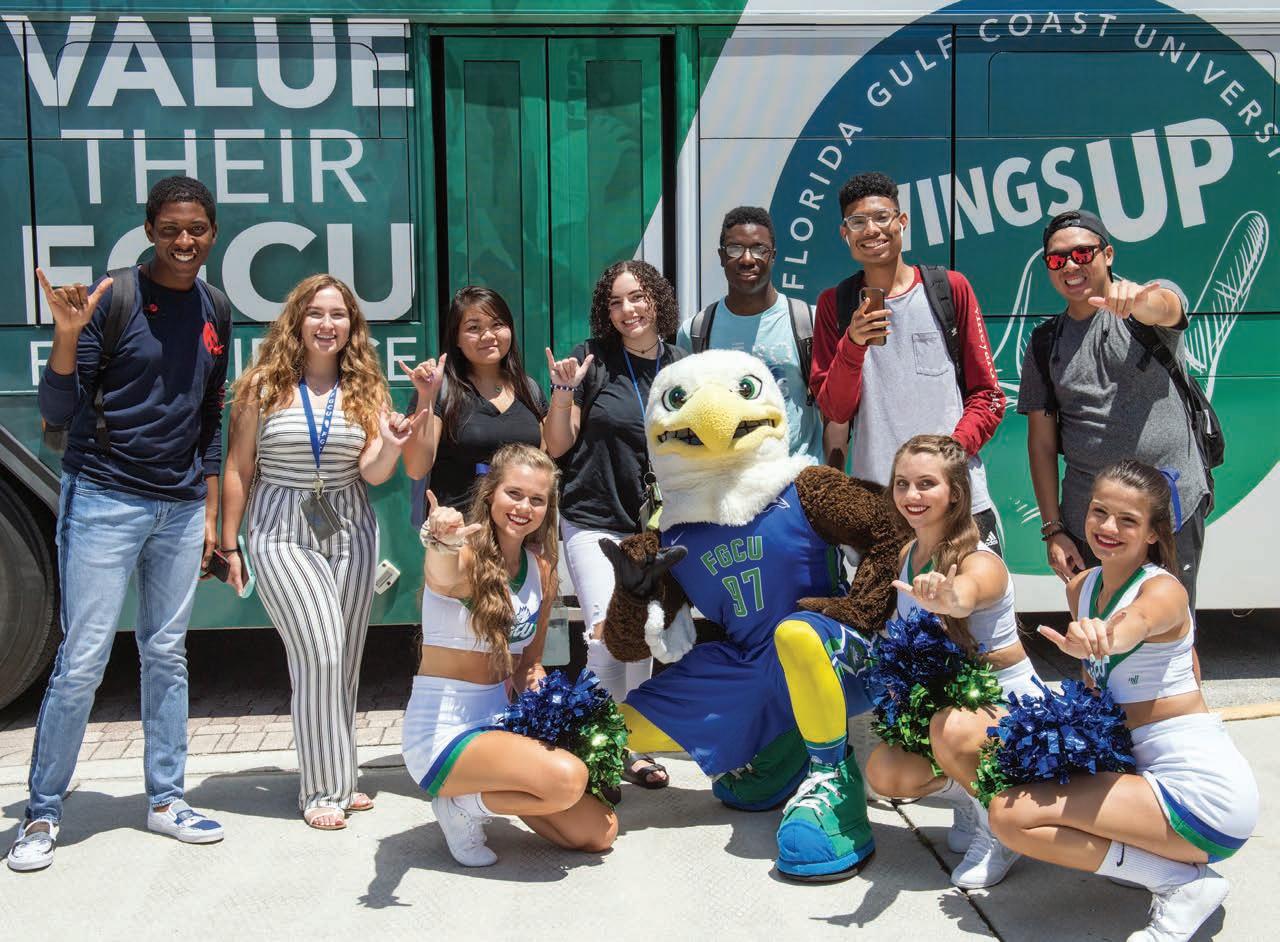
Published June 2023
STRATEGIC ROADMAP INITIATIVE
Strategic Roadmap Steering Committee
u Faculty Representative (Professor): Eric Dent
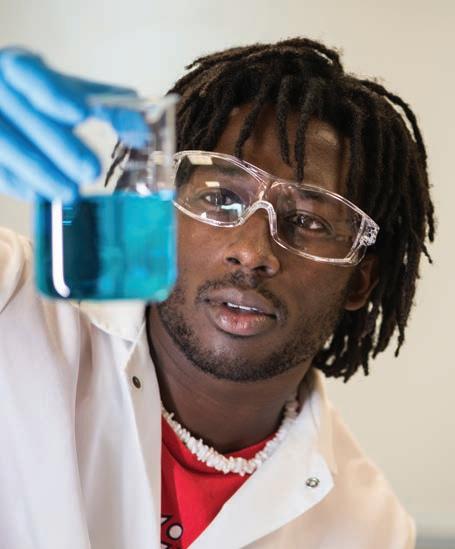
u Faculty Representative (Instructor): Felicia Goulet-Miller
u Faculty Representative (Adjunct): John Roth
u Student Representative: Tyler Varnadore
u Alumni Representative: Harry Casimir
u Donor/Foundation Representative: Chuck Ketteman
u Athletics Representative: Lauren F. Leister
u Campus Life Representative: Chris Blakely

u Academic Leadership Representative: Amelia Biehl
u Academic Advising Representative: George Williams
u Staff Representative: Lisa Banks
u Staff Representative: Amy Craig
u Staff Representative: Aisha Lewis
u FGCU Board of Trustees Representative: Erika Donalds
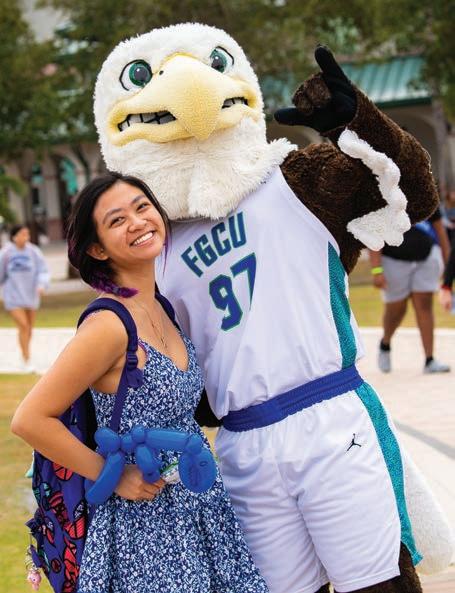
u Consultant: Jeffrey Garland
Strategic Roadmap Executive Committee
u Mitch Cordova, Vice President, Student Success & Enrollment Management
u Kitty Green, Vice President, Advancement
u Mark Rieger, Executive Vice President and Provost
u Aysegul Timur, Vice President and Vice Provost for Strategy and Program Innovation
u David Vazquez, Vice President, Administrative Services and Finance & Executive Director, Financing Corporation
2 FLORIDA GULF COAST UNIVERSITY STRATEGIC ROADMAP INITIATIVE - 2023
Purpose
FGCU is creating the framework for its next Strategic Plan.
In 2023, Florida Gulf Coast University will welcome a new president and complete the 2017-2023† FGCU Strategic Plan. In order to prepare for both events, the President’s Cabinet and Board of Trustees implemented the FGCU Strategic Roadmap Initiative, a framework to facilitate FGCU’s next strategic plan. The initiative focused on extensive internal and external input to provide the incoming president with an indicator of FGCU’s current state, as well as the factors that will impact the future of the university.
Methodology
A 13-member steering committee, broadly representative of students, faculty, staff, alumni, and donors, was appointed in spring 2022. The committee developed a framework for gathering input from stakeholders to be used during dozens of town hall meetings and focus groups. The committee created a uniform list of questions to ask stakeholders, who were invited to take part in scheduled feedback sessions throughout the summer and fall terms of 2022.
FGCU Strategic Planning Timeline 2022-2024*
Phase 1: Listening, Learning, Synthesizing
Phase 2: Strategic Plan
*Due to the delay in the presidential search process, the initial timeline has been modified.
Strategic Planning Survey Questionnaire
The Strategic Planning Survey Questionnaire trends. The results for each question are categorized (Appendix A) was created to serve as the primary as either stemming from internal (faculty, staff, method of collecting consistent and measurable students) or external (community members, publicdata from all stakeholders. The questions were private sector leaders, advisory boards, legislators) structured to identify contributors to FGCU’s groups to determine whether viewpoints varied strengths, weaknesses, opportunities, and threats between the groups. Overall responses, as well as (SWOT). However, the input and feedback gathered those segregated by internal and external groups, are were not conducted as a traditional SWOT analysis, presented in this summary. but rather used as generalized feedback to identify
† The President’s Cabinet and Board of Trustees agreed to extend the FOCUS 2017-22 Strategic Plan for a year due to the delay in the presidential search process.
Gather Input, SWOT Analysis Review Input Strategic Summary Define Goals, Strategies, Objectives FINAL STRATEGIC PLAN April 18-August 30 September 2022 October 2022- July-December 2023 January 2024 June 2023
FLORIDA
UNIVERSITY STRATEGIC ROADMAP INITIATIVE - 2023 3
GULF COAST
Collection Methods
A series of meeting methods were used to collect the questionnaire data based on the audience.
1. Town hall meetings were held in person and/or virtually, led by committee members stepping each question. Attendees were asked to provide answers to questions collected using polling software accessible by their smart phones or computers. Additionally, the committee members promoted an open dialog of discussion with feedback noted by committee members/staff support.
2. One-on-one meetings were offered to some audiences, like the FGCU Board of Trustees and other elected officials, such as the Lee County Board of Commissioners, due to the Sunshine Law.
3. A web-based survey (Appendix B) was released in November 2022 that included the same questions asked in town halls and focus groups, as well as additional questions regarding the respondent’s opinion of FGCU’s impact on the community. While the web-based survey generated 877 responses, the results should be interpreted with the anticipation of some duplicated responses because the survey link was also shared with participants of town hall meetings.
Strategic Roadmap Website, Communication, and Participation
The Strategic Roadmap Steering Committee also developed a website to provide instant and transparent information to internal and external stakeholders.
fgcu.edu/roadmap
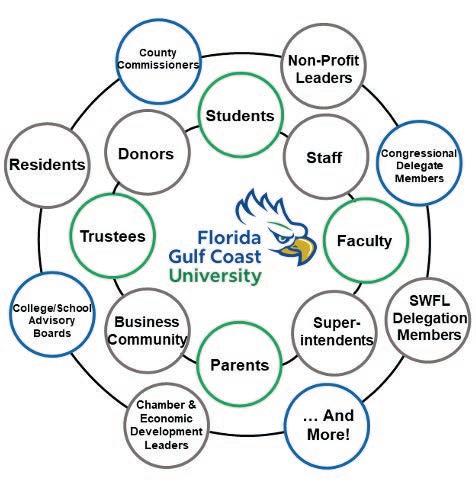
Additionally, a comprehensive communication plan (available on the roadmap website) was developed and implemented by FGCU Marketing & Communications. Meeting schedules were communicated via email messages and social media channels.
The adjacent charts summarize the number of in-person and virtual town halls, as well as the individual meetings and the attendees/constituents involved. The second chart excludes online survey participation.
Participation
FLORIDA GULF COAST UNIVERSITY STRATEGIC ROADMAP INITIATIVE - 2023 4
63 58 787 Audience Profile MEETINGS SCHEDULED MEETINGS COMPLETED PARTICIPANTS
Stakeholders
Internal Stakeholders
Internal focus groups were identified for data collection and were held in person and/or virtually following the format of the Strategic Roadmap questionnaire.
A total of 25 internal town hall meetings were conducted with the following stakeholders:
u Staff
u Faculty
u Students
u Alumni
u President’s Cabinet
u FGCU Foundation Board
u FGCU Financing Corporation Board
u FGCU Board of Trustees
External Stakeholders
External focus groups were identified for data collection and held in person and/or virtually following the format of the Strategic Roadmap questionnaire.
A total of 30 external focus group meetings were conducted. In addition to families of FGCU students, the following stakeholders from the five-county region of Southwest Florida (Charlotte, Collier, Glades, Hendry, and Lee counties) were engaged in the process:
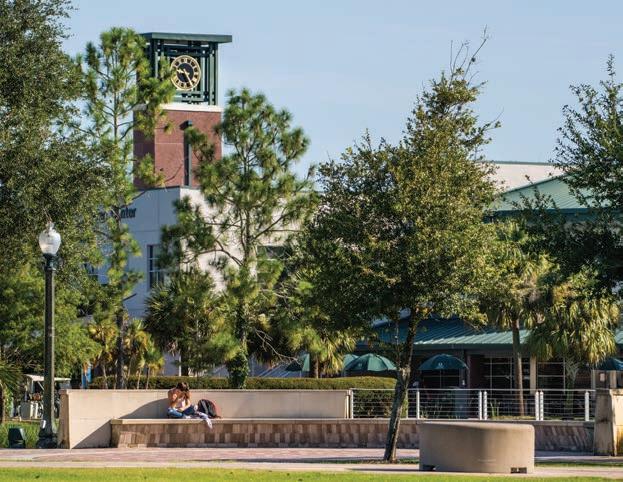
u K-12 school superintendents
u Community residents
u Regional businesses
u Southwest Florida nonprofits
u Economic development officials
u Board of County Commissioners
u Chambers of Commerce officials
Analysis and Presentation
Input from participants of town halls and focus groups was collected using the Poll Everywhere platform or manually for single-person interviews. Responses are presented as word clouds, where the most common responses have the largest font. More than 800 respondents provided input in the town halls and focus groups, though not every survey question was answered by each respondent. For most questions, word cloud results are shown as follows:
u All stakeholder feedback combined
u Internal stakeholder feedback
u External feedback
Special Acknowledgements
The scheduling and preparation of Strategic Planning stakeholder meetings as well as the compilation, review, and production of final summary documents would not have been possible without outstanding staff support from the following individuals and departments:
Tracie Beck, Support Coordinator, Office of the President; Julie Eacho, Executive Assistant, Office of the Provost and Academic Affairs; Pamela McCabe, Coordinator of University Communications & Media Relations; Shelby Smith, Administrative Specialist, Office of the Provost; Kristin Toth, Administrative Specialist, Office of the Provost; and University Marketing & Communications.
5
INITIATIVE
2023
FLORIDA GULF COAST UNIVERSITY STRATEGIC ROADMAP
-
Top Recurring Themes
As feedback was collected and analyzed, FGCU’s Strategic Roadmap Steering Committee observed a recurring theme of topics brought up by internal and external stakeholders. Those ideas are summarized in the following 12 points of focus, serving as a guide for FGCU’s next strategic plan.
u Students, faculty, staff, and the community enthusiastically support FGCU. Stakeholders look to the university for athletics, cultural engagement through the visual and performing arts, subject-matter expertise of the faculty, and WGCU Public Media.
u Florida Gulf Coast University is young – and that is to its advantage. FGCU is nimble, and it can pursue new opportunities quickly and efficiently while responding to the changing dynamics and workforce needs of Southwest Florida.
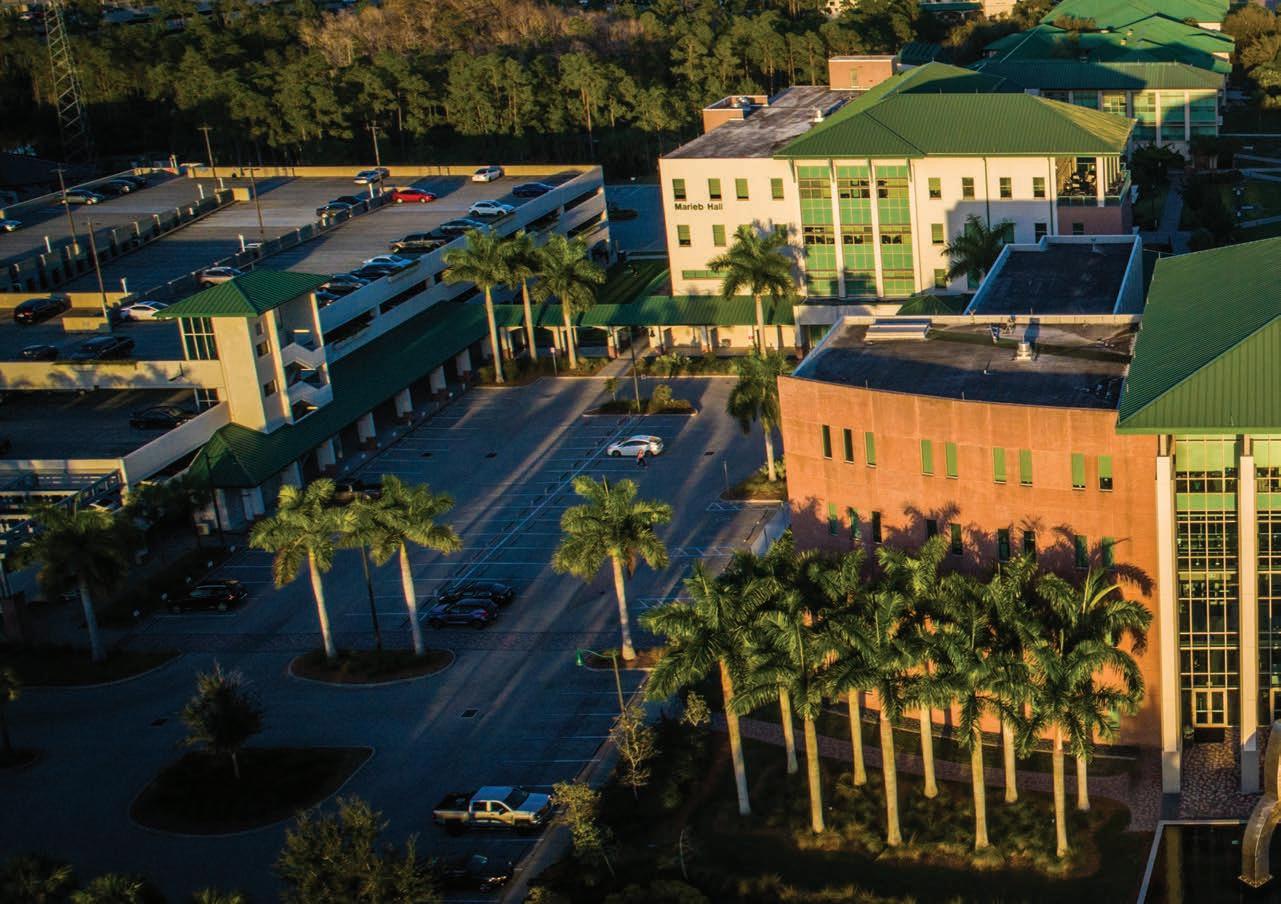
u FGCU is grounded in the priorities of the fivecounty area it specifically serves. As it grows,
the university needs to demonstrate that commitment physically and programmatically. Of particular concern is how the university can balance its physical presence across Charlotte, Collier, Glades, Hendry, and Lee counties.
u The university’s focus on sustainability and the environment is unique, differentiating FGCU from institutions around the state and nation. As students graduate and enter the workforce, they bring that perspective with them, further enhancing the regional impact of sustainable practices and environmental awareness.
u FGCU is a major economic force in Southwest Florida, both as a major employer and a key educator of an ever-growing workforce.
u Faculty and staff recruitment, development, and retainment can be challenging because of the cost of living and compensation restrictions.
6 FLORIDA GULF COAST UNIVERSITY STRATEGIC ROADMAP INITIATIVE - 2023
u Faculty and students are concerned about keeping freedom of expression a priority.
u The use of ever-evolving technologies will play a major role both in campus infrastructure and how education is delivered to students and community members, now and in the future.
u Stakeholders see an urgent need to strategically develop sustainable growth plans for the university and understand how these plans will impact the need for facilities both on and off campus. Affordable housing is a concern for employees and students alike, but it is worth noting that the university is among the top in the system for providing on-campus accommodations to its student population.
u Great support exists for increasing research and graduate programs at FGCU, as long as these efforts reflect the community’s priorities and the needs of undergraduates. The Water
School is a good example of applied, relevant, interdisciplinary research that can benefit Southwest Florida in tangible ways.
u Accessibility to an FGCU education is important both for students and community members. Priorities should focus on financial support for students as well as making the university accessible for diverse segments of the community, especially as the university pursues designation as a Hispanic-Serving Institution.
u The community supports FGCU’s ambitions to increase student success and the co-curricular support students require. Areas highlighted by stakeholders include a greater focus on mental health and wellness initiatives, academic counseling and tutoring services, and career development services, including internships and mentoring opportunities from peers, alumni, and community partners.

- 2023 7
FLORIDA GULF COAST UNIVERSITY STRATEGIC ROADMAP INITIATIVE
Question 1. When you think of FGCU, what impressions or words come to mind?
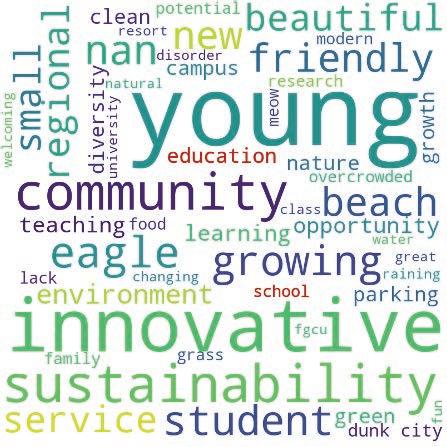
Question 1- All stakeholder feedback
Question 1- External feedback
Question 1- Internal feedback
Most Significant Themes and Opportunities
Impressions from all constituencies reflect a sense of pride in the university, its students, faculty, and staff, and its accomplishments over the first 25 years. The university is described as a young, entrepreneurial, adaptable, and innovative campus that cares deeply about its students, environment, regional sustainability, and service to the community. About 90% of campus and community respondents through the online survey indicated they were proud FGCU was part of the community and would recommend it to prospective students. However, respondents indicated there have been natural growing pains associated with being a younger institution. As FGCU’s enrollment and program growth continues at a fast pace, some perceive limitations with on-campus parking and funding sources.
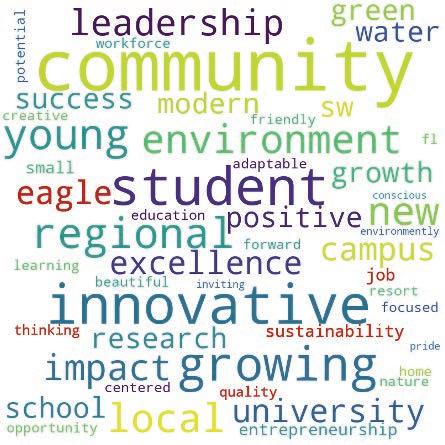
External stakeholders strongly emphasized the positive impact the university has had on the community, the quality of FGCU’s graduates, and the institution’s future potential. Donors, in particular, value how FGCU listens to the workforce needs of the community and how it has been a driver of the business community. It is evident that the external community has great pride in FGCU.
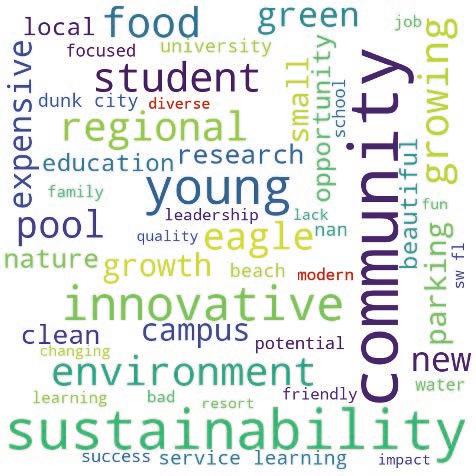
FLORIDA GULF COAST UNIVERSITY STRATEGIC ROADMAP INITIATIVE - 2023 8
Students, faculty, and staff frequently commented on the benefits of FGCU’s student-centered teaching focus as a regional comprehensive university and the institution’s impact on the community. However, they identified challenges, such as navigating a tight budget that requires employees to do more with less and a need for more robust communication from campus leaders and across divisions and departments.
All respondents regularly commented on the growth potential and opportunities ahead for FGCU:
u FGCU is innovative, nimble, adaptive, and inclusive.
u The university’s focus on sustainability and the environment is attractive and differentiates FGCU from its peers.
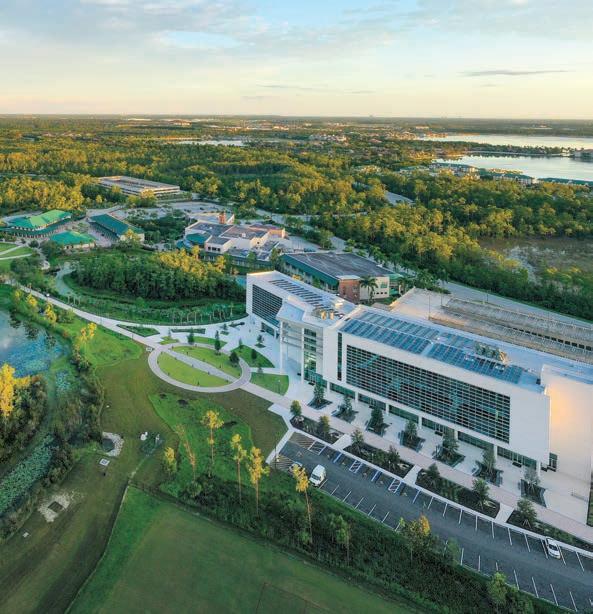
u FGCU’s focus on service to the community resonates with staff, faculty, and students.
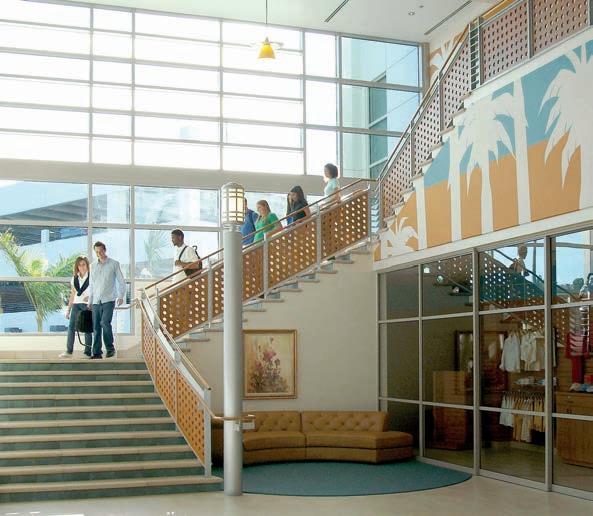
u The Water School and WGCU are seen as major successes, important community assets, and opportunities for further development.
Further Considerations
Concerns raised by external groups include the need for a greater focus on Charlotte, Collier, Glades, and Hendry counties, risks of Florida’s political environment, and the need to define a few unique strengths where FGCU can excel. A few comments mentioned a need to better prepare students for careers and employment, as well as the difficulty of working across disciplines.
GCU list
9 FLORIDA GULF COAST UNIVERSITY STRATEGIC ROADMAP INITIATIVE - 2023
F following a long-st GCU listens to the community instead of long-standing tradition like other universities. We respond to local needs.”
Question 2. How does FGCU make an impact in the Southwest Florida community?
Most Significant Themes and Opportunities
Responses from all internal and external groups show the breadth of FGCU’s impact.
Students shared that FGCU’s impact on the Southwest Florida community can be seen in the university’s commitment to developing the skills and capabilities the community and workforce need. As the local region evolves into an economic hub, FGCU is enhancing the quality of students entering the workforce by expanding its micro-credentialing and digital badging initiative, internships, and other work-based learning opportunities. Respondents also commented on how the university transforms the individual lives of its students, and the positive impact FGCU has on first-generation-in-college students.
External respondents noted many examples of how the university collaborates with the community, and FGCU is seen as a focal point for major initiatives, including environmental quality, healthcare, and construction management. Cultural and intellectual impacts have also occurred through lecture series, art exhibitions, concerts, theater, and athletic events. Many respondents credited FGCU with assisting in bringing the region together to focus on relevant issues, including the applied research in The Water School, and how FGCU has played a role in enriching the local economy by retaining talented graduates in Southwest Florida.
FGCU’s service-learning hours requirement is viewed as a key asset for the community. Respondents cited examples of how students and faculty are engaged with the community, and how FGCU is educating those who will one day become leaders in the surrounding community. FGCU is seen as a “thought leader,” as it helps shape the goals of the region. Overall, more than 86% of survey respondents indicated that FGCU is an important part of the cultural, social, health, and economic life of Southwest Florida.
Looking into the future, many respondents mentioned opportunities for growth by:
u Expanding research focused on regional issues, especially with The Water School.
u Continued and expanded regional collaboration.
Further Considerations
A few concerns were raised on the impact of FGCU’s growth on the surrounding community, including higher housing costs and using up available land throughout Southwest Florida to meet the future needs of the university. There is also a desire for improved marketing to the community about FGCU events.
10 FLORIDA GULF COAST UNIVERSITY STRATEGIC ROADMAP INITIATIVE - 2023
Y wer ou You e a bud and now you’re about to blossom, and the direction you’re going to blossom into is critical for Southwest Florida.”
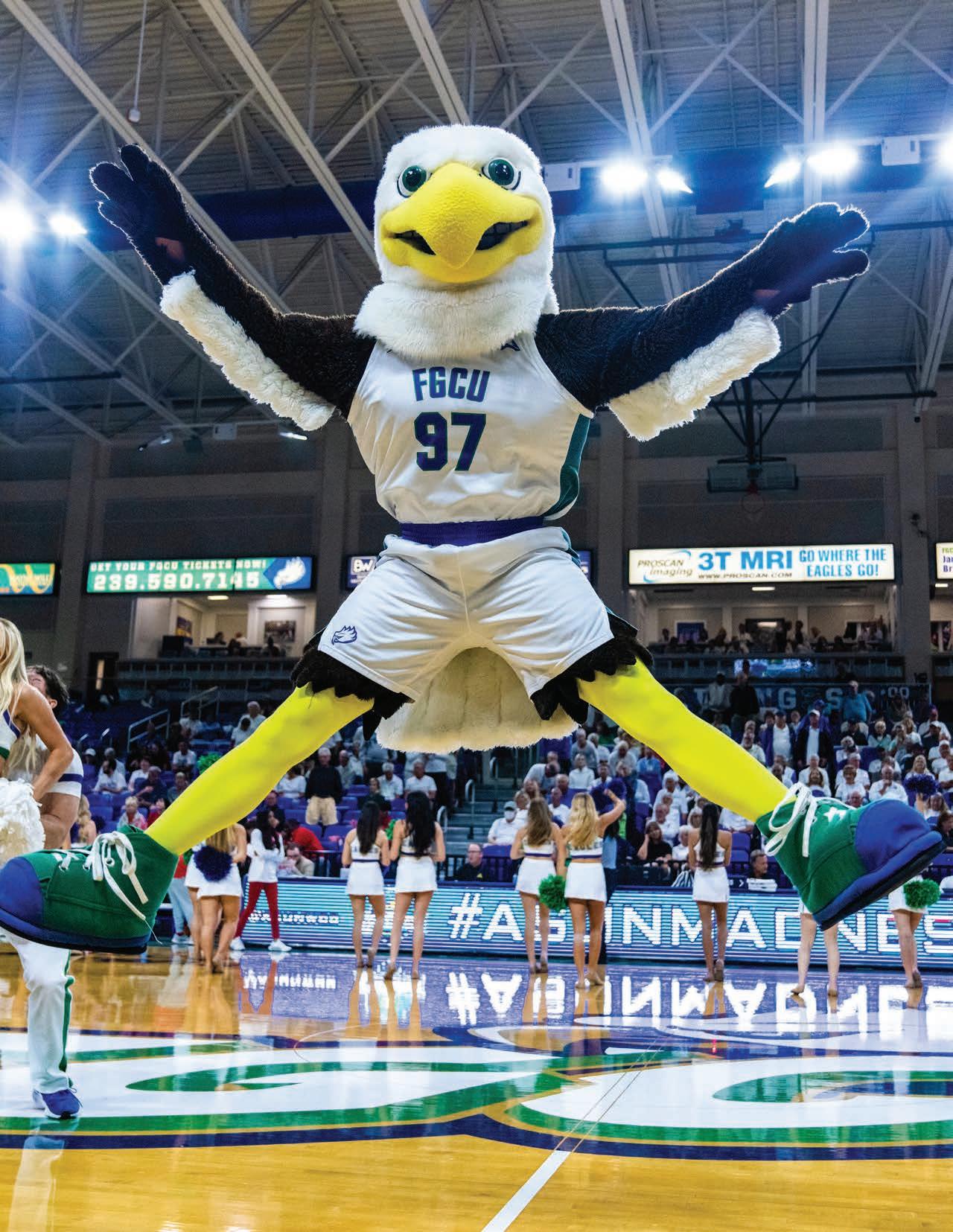
FLORIDA GULF COAST UNIVERSITY STRATEGIC ROADMAP INITIATIVE - 2023 11
Question 3. What should be FGCU’s top three priorities?
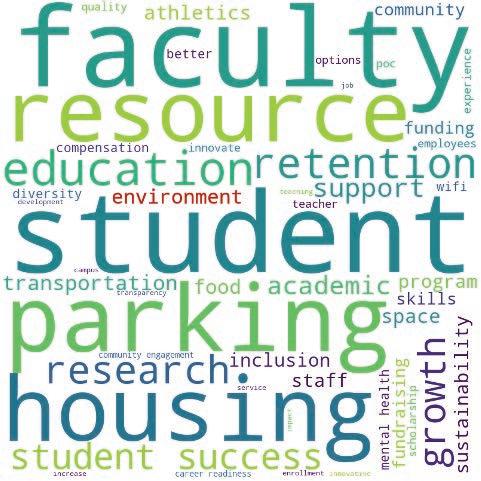
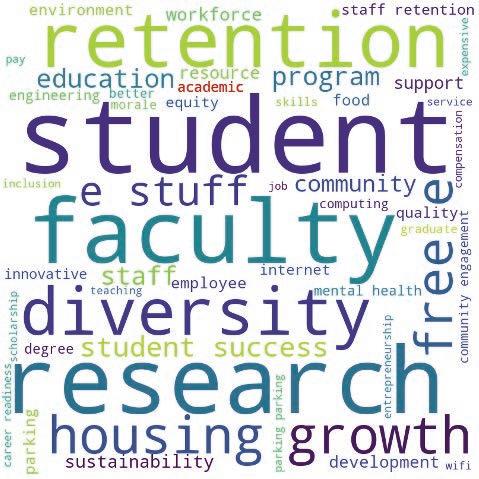
Question 3- All stakeholder feedback
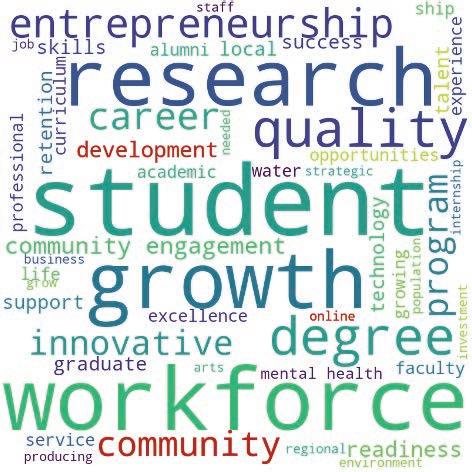
Question 3- External feedback
Question 3- Internal feedback
12 FLORIDA GULF COAST UNIVERSITY STRATEGIC ROADMAP INITIATIVE - 2023
Most Significant Themes and Opportunities
Research, scholarship, student success, diversity, investment in employee development, recruitment of quality employees, and the retention of faculty, staff, and students should be among the university’s top priorities moving forward.
From a research perspective, respondents encouraged FGCU to “develop a culture of research” with the “full engagement of the student.” External audiences emphasized the importance of applied, relevant, interdisciplinary research that can benefit Southwest Florida in tangible ways and connect the university to the needs and values of the community. All stakeholders described research as a vehicle for student learning and community engagement. Student success was also frequently mentioned, with respondents acknowledging the improvements FGCU has already put in place and the work still required. As one of its guiding principles, FGCU believes diversity is a source of renewal and vitality, and participants expressed a need to improve faculty and staff diversity to better align with the university’s student population. Making FGCU a career choice for faculty and staff, not simply a starting point, was emphasized by respondents, who also see the need for the university to focus more on the well-being of employees and students, including mental health. Headwinds to retention efforts include housing costs, salary, and general support.
While speaking about the university’s priorities, constituents noted opportunities to address the school’s growth and a nimbleness to respond to the needs of the local workforce:
u The cost, quality, and availability of student housing was a priority raised by students and their families. While FGCU houses more than 30% of its total student population, making it among the highest housing percentages in the State University System, Southwest Florida’s housing market remains a challenge for those not able to secure on-campus housing. Students also noted an opportunity to make more parking available on campus, particularly in the main academic corridor.
u Likewise, community members perceived FGCU’s campus resources, including parking lots and academic space, as being strained by the institution’s growth, and it was suggested that there needs to be a strategic allocation of resources and space to accommodate FGCU’s growth.
u External town halls offered a glimpse into the priorities of the five-county region, revealing workforce readiness as a common priority. Teacher and healthcare worker shortages were commonly cited in discussions, and FGCU was seen as a solution for the regional workforce pipeline, enabling locally grown talent to stay in Southwest Florida.
Further Considerations
Stakeholders believe it is important for university leaders to be involved and visible in the community as regional leaders and advocates. Athletics plays a part of this visibility and recognition, with academic programs, like those seen in The Water School, reflecting the unique landscape of Southwest Florida.
FLORIDA GULF COAST UNIVERSITY STRATEGIC ROADMAP INITIATIVE - 2023 13
FGCU should be the first choice f the communit GCU should be the first choice for parents, students, and the community… FGCU should be called the best place to work in Southwest Florida. There is an opportunity to make it stronger and set the university as an example to others.”
Question 4. Which specific programs or activities make the most impact on student success and the community?
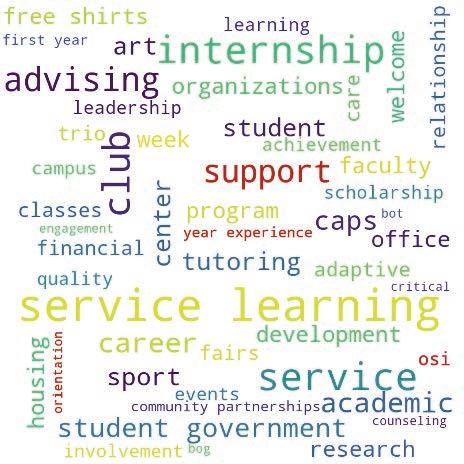
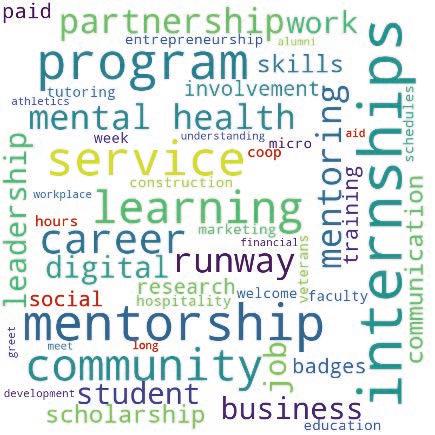
Question 4- All stakeholder feedback
Question 4- External feedback
Question 4- Internal feedback
Most Significant Themes and Opportunities
When speaking about FGCU’s key impacts to student success and the Southwest Florida community, all stakeholders recognized the importance of support services and extracurricular activities. It is believed that connecting FGCU students to the community through service-learning hours, civic engagement, transferable skills, career readiness, and partnerships has a positive impact on Southwest Florida and beyond. Among the top responses were internships, service-learning hours, advising, career services, applied research, mentorship, clubs, and other forms of extracurricular support, such as tutoring.
Students, faculty and staff emphasized the impact of academic advising, student-led organizations and counseling services on student outcomes, while stakeholders in the community placed a greater focus on services that align students to the workforce, such as career services, mentors, partnerships, leadership opportunities, and community involvement. Slightly less prominent than these topics was “mental health,” a phrase that only appeared in external feedback. Students and employees referred to the impact of counseling in more specific topics, with mentions of academic advising, Counseling and Psychological
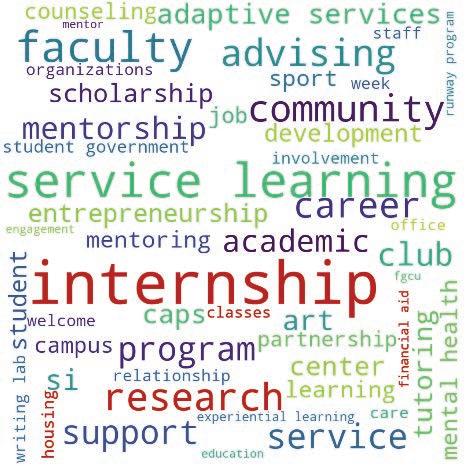
14 FLORIDA GULF COAST UNIVERSITY STRATEGIC ROADMAP INITIATIVE - 2023
Services (CAPS), Adaptive Services, and peer-to-peer relationship building opportunities offered through on-campus involvement. One noticeable difference is a greater mention of high-impact practices, such as research and advising from internal constituents. Co-curricular activities are clearly regarded as impactful on student success at FGCU.
Opportunities for growth include:
u Further development of transferable skills and the digital badge program, along with work-based learning in partnership with local employers.
u Connecting classroom-based learning and labs with the real world.
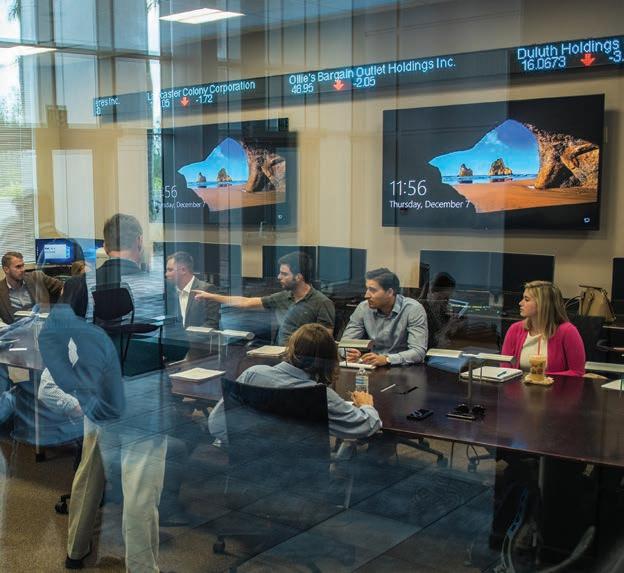
u Applied and translational research to answer questions posed by the Southwest Florida community. FGCU’s in-house experts can offer solutions to the community through local media.
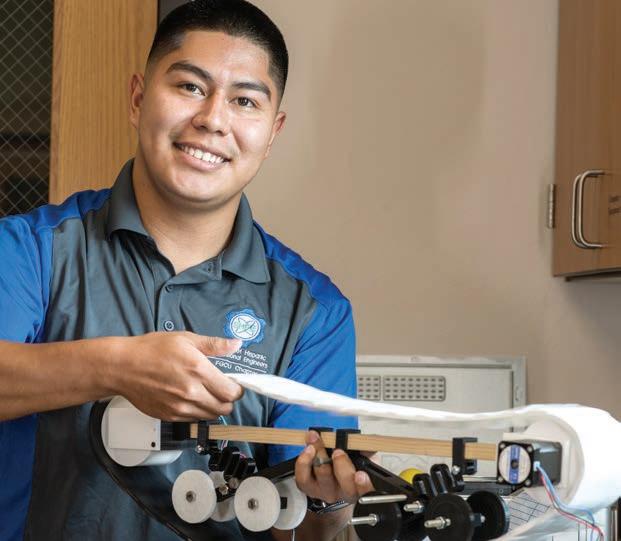

u Create centers and institutes with a specific focus that is tied to the needs of the local workforce.
u Broaden communication channels to ensure students and faculty are in touch with the needs of the local communities.
Further Considerations
There were no prominent, repeated references to a specific academic program in response to this question in either town halls or in the online survey. However, there are references to FGCU’s plethora of academic programs, such as entrepreneurship, business, hospitality, construction, health, arts, education, water, and colloquium. While The Water School is often used as an example for applied research, especially by the community and external stakeholders, no one program at FGCU seems to be thought of as more impactful than another.
Question 5a. The following are FGCU’s current strategic focus areas. Which do you view as most important?
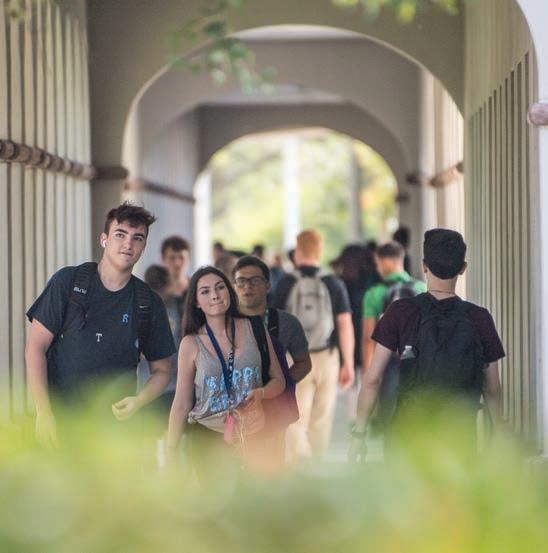
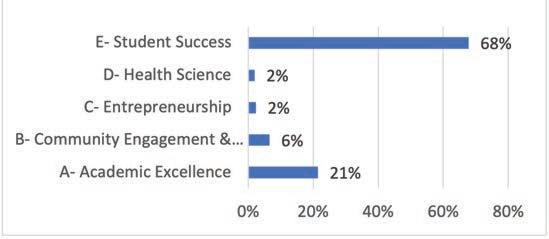
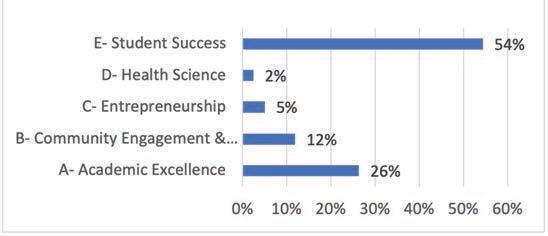
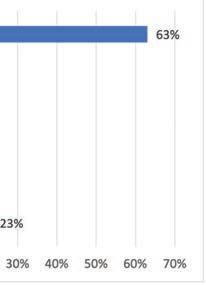

MOST Important Pillar - All stakeholder feedback
MOST Important Pillar - External feedback
MOST Important Pillar - Internal feedback

an
e
The univ ven gr
16 FLORIDA GULF COAST UNIVERSITY STRATEGIC ROADMAP INITIATIVE - 2023
The university is relevant. FGCU has great potential for making an even greater impact on the community. Being relevant to (the) local community by meeting the needs of the local community.”
Question
LEAST Important Pillar - All stakeholder feedback
excellence. Some commented that student success would logically flow from academic excellence, illustrating the interconnectedness of the two pillars. It is worth noting that academic excellence was ranked higher than student success in the online survey, creating one of the largest differences between live forum and online results. Community engagement was consistently ranked as the third most important focus area by all stakeholders, whether the input came from live forums or the online survey.
LEAST Important Pillar - External feedback
Health sciences and entrepreneurship were the least important pillars for FGCU, with entrepreneurship ranking lower than health sciences in the live forums. In the online survey, little difference occurred between the two pillars. Follow-up questions showed that most audiences found the pillars for health sciences and entrepreneurship to be out of place relative to broader focus areas of academic excellence, student success, and community engagement. With this in mind:
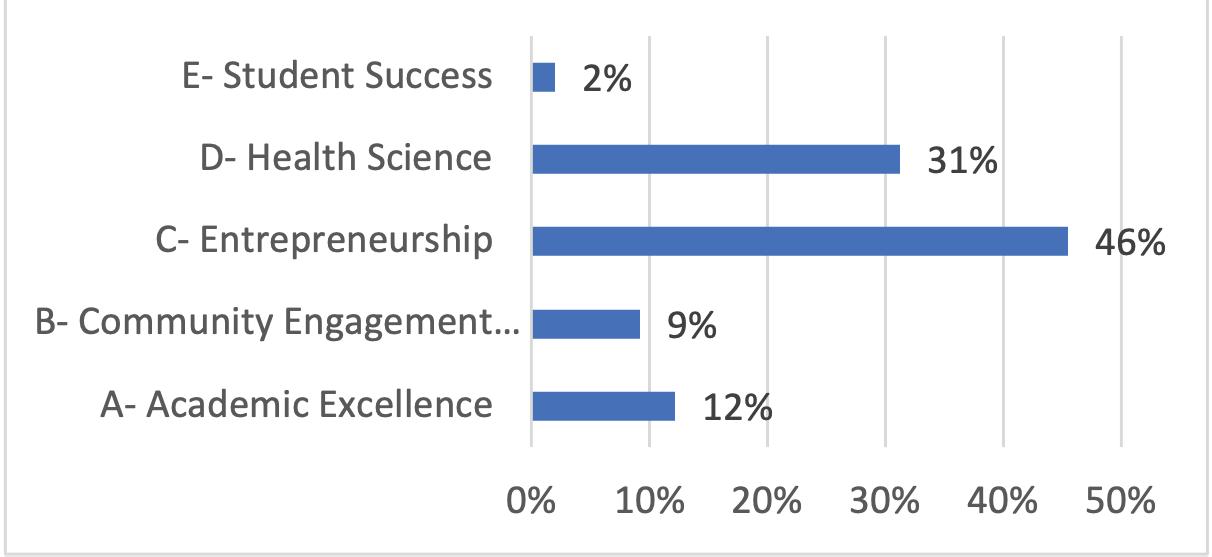
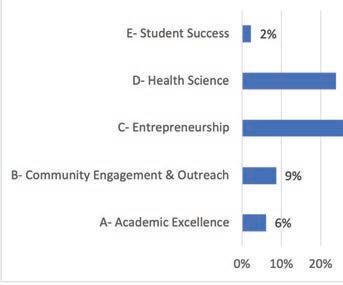
u Many respondents thought the focus areas of entrepreneurship and health sciences related to specific units of the university and seemed unclear as to why they would be included as university-wide strategic emphases.
LEAST Important Pillar - Internal feedback
u Comments suggested that “entrepreneurial mindset” would be an important outcome for FGCU graduates, regardless of their discipline, and this phrasing might avoid conflation of this overarching principle with one of seven academic units.
Further Considerations
Most Significant Themes and Opportunities
Internal and external audiences agree that student success is the most important pillar, or strategic focus area, for the university, followed by academic
About 75% of 877 survey respondents agreed that FGCU could be characterized as an innovative and entrepreneurial university. If the university eliminated or renamed the pillars related to entrepreneurship and health sciences in the next strategic plan, feedback suggests there is broad support for other themes, such as entrepreneurial mindset, sustainability, environment, research, technology, and diversity.
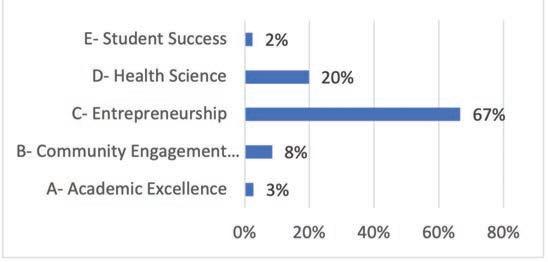
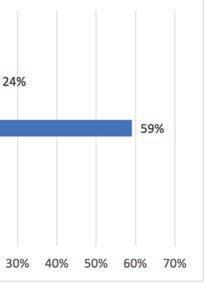
5b. The following are FGCU’s current strategic focus areas. Which do you view as least important?
Student success is the bottom line of any educational institution.”
FLORIDA GULF COAST UNIVERSITY STRATEGIC ROADMAP INITIATIVE - 2023 17
Studen
Question 6. Please tell us any additional strategic areas that should be included.
Question 6-All stakeholder feedback
Question 6- External feedback
Question 6-Internal feedback
Most Significant Themes and Opportunities
Town hall and focus group responses highlighted themes related to diversity, equity and inclusion, research, technology and sciences, the environment, and workforce readiness.
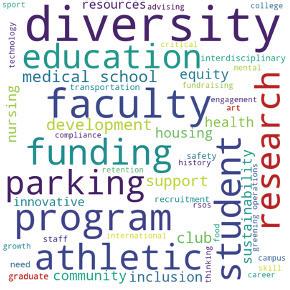
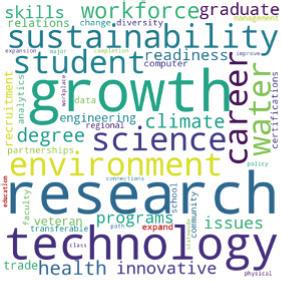
FGCU students, faculty, and staff emphasized diversity more strongly than external stakeholders and respondents via the online survey. Students commented that a Hispanic-Serving Institution designation would be a “big deal” for the community and wished to “see more people of color on campus.” An employee indicated the importance of “creating space for students of diverse backgrounds so they can help shape the university.” Internal stakeholders brought up issues related to parking, athletics, and funding. Non-instructional employees feel that staff should be added as a strategic area, and all employees – faculty and staff – are concerned with equity, careers, resources, morale, and better pay.
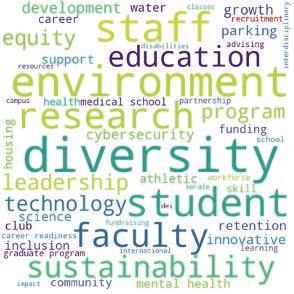
18 FLORIDA GULF COAST UNIVERSITY STRATEGIC ROADMAP INITIATIVE - 2023
c
knowledge.”
External stakeholders emphasized growth, the environment and sustainability, as well as research, technology, and science. One community member said, “We need to focus on sustainability and resilience in the region (and) building communities back.”
Conversations within the Strategic Roadmap Steering Committee suggested that “workforce” become a pillar, which would have both external and internal components. Preparing students to be career-ready was a recurring theme, and respondents discussed opportunities for students to complete internships, job shadowing experiences, and co-op programs while learning specialized skills through quality credentialing programs. FGCU has established strong community partnerships that ensure the workforce readiness of graduates. One comment from the Economic Development/Chamber of Commerce Focus Group specifically emphasized that FGCU is becoming a talent town square for the region.
Across all stakeholders, the importance of good health and well-being for FGCU students was emphasized. Employees stressed that “first-year

students can’t learn study strategies and effective test-taking strategies if they aren’t taking care of themselves.” Students stressed the importance of financial literacy, while trustees underscored the importance of “student enrichment,” building a “student culture,” and pairing alumni mentors with current students.
Respondents frequently mentioned opportunities to focus on:
u Themes around the topics of health, environment and sustainability, student success, business, and science.
u Service-learning hours are important for student success, and the university having a positive impact on the community.

Further Considerations
The themes “sustainability and community resiliency” and “environment” were prominent responses in Question 6, which asked about strategic areas or pillars. Sustainability and environment are frequently associated with FGCU’s mission.
FLORIDA GULF COAST UNIVERSITY STRATEGIC ROADMAP INITIATIVE - 2023 19
you how to use those things, navigate, apply that Class can teach you things. Mentorship can teach ho Class
Question 7. Please tell us any areas/initiatives that should NOT be included in FGCU’s next strategic plan.
Question 7 – All stakeholder feedback
Question 7 – External feedback
Question 7 – Internal feedback
Most Significant Themes and Opportunities
Entrepreneurship, creating a medical school, and launching a football program were the three most frequently cited topics to avoid as pillars in the next strategic plan, according to feedback from town hall, focus group, and online survey audiences. Collegiate athletics – football in particular – are of great interest within the state, and the aversion to having football stems from the associated costs of the program. It is the same for medical, law, pharmacy, or dental schools. With respect to entrepreneurship, there was no indication that anyone believed the program should not exist at FGCU, only that it does not need special reference or focus in strategic planning. The word “none” was one of the most prominent responses in the online survey, which suggests most people do not see any active programs that should be discontinued.


Other responses were diverse and varied, depending on the audience. Generally, students, faculty, and staff focused on university operations (size of

20 FLORIDA GULF COAST UNIVERSITY STRATEGIC ROADMAP INITIATIVE - 2023
administration, culture, enrollment), while external constituencies were concerned with politically charged issues and would like the university to remain focused on the local community instead of pursuing an excessive number of directions.
Additional opportunities recommended by internal audiences:
u Faculty and staff commented about a need for a more supportive work environment with more frequent, transparent communication from administration, slowing enrollment growth, and making the campus more active on the weekends.

u There were only 11 comments from students, which included removing the service-learning hours requirement, teaching Colloquium differently, renovating North Lake Village, and allowing students more control over fee expenditures.
Further Considerations
Responses generally indicated a desire to be thoughtful in planning initiatives and not spreading the campus too thin. This is consistent with the title and theme of the former strategic plan, Focus 2017-2022.
F
FLORIDA GULF COAST UNIVERSITY STRATEGIC ROADMAP INITIATIVE - 2023 21
ocus on where Focus on FGCU can be great. Select a target and stay committed.”
Question 8. What undergraduate or graduate programs should FGCU consider as Southwest Florida grows and develops?
Question 8 -All stakeholder feedback
Question 8 - External feedback
Question 8 -Internal feedback
Most Significant Themes and Opportunities
A relatively large number of programs were cited in this question, with some noted differences between internal and external audiences. A general theme of growing graduate programs emerged, along with specific foci on engineering, management, and healthcare. Those areas are all extremely broad, and some of the comments made specific reference to areas such as architecture, data analytics, cyber security, homeland security, behavioral sciences, healthy aging, sustainability, electrical and mechanical engineering, and interdisciplinary tracks.


u Regarding healthcare, specific reference was made to nursing and an expansion of FGCU’s physician assistant and other health sciences programs. While the term “medical” appeared prominently in feedback from internal audience groups, there was no specific encouragement for a medical school.

22 FLORIDA GULF COAST UNIVERSITY STRATEGIC ROADMAP INITIATIVE - 2023
u Sports management and education were also frequently mentioned by internal groups, and “forensic investigations” was one of the most frequently mentioned programs overall.

u Agriculture, a major industry in Southwest Florida, was minimally mentioned by external audiences Expansion of construction management was also referenced as Southwest Florida grows.

Further Considerations
Mental health and counseling do not appear on the word maps, but are referenced as part of the topic of “healthcare” and emerged in discussions of other questions. “Management” was frequently mentioned in live and online audiences, but comments did not specify programs within this broad area except business sustainability, risk, and resource management. Offering doctoral programs in business administration, water, and health-related sciences were mentioned in reference to graduate program growth.
FLORIDA GULF COAST UNIVERSITY STRATEGIC ROADMAP INITIATIVE - 2023 23
The biggest impact is hiring - FGCU F is producing the workforce that SWFL needs. We are doing a good job but could be doing better.”
Most Significant Themes and Opportunities
Recurring themes for both internal and external constituents were fairly consistent. Overall, there is a desire for FGCU to grow in capability and stature. Complex issues concerning access to the university, such as financial, age and cultural backgrounds, need to be further explored. The rising cost of higher education was mentioned frequently by both internal and external audiences as well as in the online survey, and a concern was raised about the return on investment for the debt students must incur to complete their education. Additionally, the cost of living in Southwest Florida may be a serious limiting factor for hiring faculty and staff.
Alignment of FGCU’s offerings with societal need was also an overarching theme, as was adapting current learning styles to reflect changes in technology. Also, feedback about content relevance and workforce preparedness was mentioned in many of the comments.
To address these concerns, FGCU has an opportunity to:
u Increase access to virtual learning opportunities through more online classes as well as onlinebased interdisciplinary, non-traditional, and certificate programs. The priority is to maintain a focus on offering a high-quality education experience, whether instruction is online or in person.
u Ensure that the education students receive is aligned with the job market. FGCU should offer relevant degree programs for the region, address the needs of non-traditional students, and provide access to an education outside of the academic classroom.
Further Considerations
Responses indicated a need for more conversations about academic freedom, free speech, political interference in higher education, and what these issues mean to FGCU. Fundraising and messaging should be focused around the value proposition and return on investment of higher education. FGCU’s innovation in teaching and learning as well as its academic programming that showcases how the university is staying at the forefront of industry trends need to be highlighted to external audiences. Messaging should distinguish the university so the Southwest Florida community understands where FGCU stands out against its peers.
Question 9. When you think of higher education (both regionally and nationally), what do you think will be the most important challenges in the future?
24 FLORIDA GULF COAST UNIVERSITY STRATEGIC ROADMAP INITIATIVE - 2023




FLORIDA
INITIATIVE - 2023 25
Southwest Florida is currently in the middle of a workforce shortage. It is important to educate and graduate a workforce and to keep graduates here.”
GULF COAST UNIVERSITY STRATEGIC ROADMAP
Question 10. What words or phrases should describe FGCU in 2030?



Question 10-All stakeholder feedback
Question 10- External feedback
Question 10-Internal feedback
Most Significant Themes and Opportunities
“Innovative” is the most prominent word mentioned by stakeholders, although what it means for FGCU to be innovative in 2030 is open to interpretation. Some comments defined innovative as “thinking completely outside of the box” and the concept that FGCU is doing something “that other schools are not doing.”
Both internal and external participants see the university as a community-driven institution, with words like “leader” and “community” appearing prominently in online survey responses. Faculty, staff, students, and graduates use their skills, largely in the Southwest Florida workforce, to promote economic growth by meeting the needs of the community. FGCU should keep thinking about its impact beyond the campus borders and consider its placement as a vital pillar of the community. FGCU offers education beyond the classroom, as the university enhances the overall quality of life in Southwest Florida with access to the arts and athletics while providing knowledge to the region that contributes to enhanced public
26 FLORIDA GULF COAST UNIVERSITY STRATEGIC ROADMAP INITIATIVE - 2023
health and safety. Campus priorities of protecting the environment carry over into the community as well.
Feedback suggests that stakeholders expect FGCU to take action now to plan ahead for the future. For example:
u Words such as “diverse/diversity,” “sustainability,” “excellence,” “top,” “better,” “best,” “affordable,” and “competitive” were stated throughout the feedback. Collectively, these terms indicate that FGCU should become a more diverse, nationally recognized university, known for its commitments to affordability and core values such as sustainability and academic excellence.
u Comments also suggested that FGCU should build traditions for tomorrow, consider the cost of housing and its effects on recruiting quality people, and to think globally about natural disasters, like hurricanes, and infrastructure resilience.
Further Considerations
External respondents did not mention growth as often as internal stakeholders. It may be worth a deeper look at FGCU’s presence in the fivecounty region, as there were frequent comments about balancing the institution’s efforts and presence beyond Fort Myers.
Finally, it is important to note that all town halls were concluded before Hurricane Ian, a highend Category 4 storm that made direct impact with the greater Fort Myers region in September 2022. We wonder how that experience might have impacted answers. Another crisis not addressed was the impact of the COVID-19 pandemic, which precipitated considerable changes in teaching, learning, and working in higher education and may continue to influence operations through the year 2030.

FGCU has the oppor in cultural and communit GCU opportunity, and perhaps obligation, to be a leader in cultural and community events and entertainment. Such would greater connect the community to FGCU.”
FLORIDA GULF COAST UNIVERSITY STRATEGIC ROADMAP INITIATIVE - 2023 27
APPENDIX A
Strategic Roadmap Town Hall/Survey SWOT Analysis Questions
1. When you think of FGCU, what impressions or words come to mind? Why? [S/W]
2. How does FGCU make an impact in the Southwest Florida community? [S]
3. What should be FGCU’s top three priorities? [O/T]
4. Are there any specific programs or activities that make the most impact on student success and the community? [S]
5. The following are FGCU’s current strategic focus areas. Please rank these areas 1 to 5 in order of importance, with 1 being the most important and 5 being the least important. (View Definitions) [S/W/O]
u Academic Excellence
u Community Engagement & Outreach
u Entrepreneurship
u Health Science
u Student Success
6. Please list any additional strategic areas that should be included. (Please reference the list above) [O]
7. Please list any areas/initiatives that should NOT be included in FGCU’s next strategic plan. [S/W/T]
8. What undergraduate or graduate programs should FGCU consider as Southwest Florida grows and develops? [O]

9. What words or phrases should describe FGCU in 2030? [O]
10. When you think of higher education (both regionally and nationally), what do you think will be the most important challenges in the future? [O/T]
28 FLORIDA GULF COAST UNIVERSITY STRATEGIC ROADMAP INITIATIVE - 2023
APPENDIX B
Online Survey Analysis
Executive Summary
In November 2022, FGCU conducted a survey of FGCU students, faculty, staff, and community members to gather opinions on strategic priorities for the coming years. The 24-question survey asked respondents their opinion relating to FGCU’s strategic plan and sentiment on statements about the university. The survey was active from November 7, 2022, to November 18, 2022, and received 877 responses over the two-week period. A summary of the results can be found below:
u Community members represented the largest share of respondents (26.8 percent), followed by alumni (22.6 percent) and parents (20.1 percent).
u Academic excellence was considered the most important strategic area of focus, followed by student success.
u 86.6 percent of respondents somewhat or strongly agreed that FGCU is an important part of the cultural, social, health, and economic life of Southwest Florida.
u 86.9 percent of respondents somewhat or strongly agreed that FGCU provides affordable higher education in our region and Florida.
u 74.7 percent of respondents somewhat or strongly agreed that FGCU graduates are well prepared for productive and civically engaged lives and careers.
u 75.3 percent of respondents somewhat or strongly agreed that FGCU is an innovative and entrepreneurial university.
u 72.6 percent of respondents somewhat or strongly agreed that FGCU is a collaborative learning environment, where people work together to find solutions.
u 61.0 percent of respondents somewhat or strongly agreed that FGCU is a technologically advanced learning environment that reflects global technology advances.
u 72.7 percent of respondents somewhat or strongly agreed that FGCU is a diverse and inclusive community.
u 79.0 percent of respondents somewhat or strongly agreed that FGCU is connected to meaningful partners in the community.
u 64.5 percent of respondents somewhat or strongly agreed that FGCU makes it easy to access publicly available resources.
u 89.9 percent of respondents somewhat or strongly agreed that they would recommend FGCU to potential students.
u 90.4 percent of respondents somewhat or strongly agreed that they are proud that FGCU is part of the Southwest Florida community.
u 25.8 percent of participants said they visit FGCU’s campus daily or weekly, while 12.9 percent visit the campus six to ten times a year.
FLORIDA GULF COAST UNIVERSITY STRATEGIC ROADMAP INITIATIVE - 2023 29
Prepared by the Regional Economic Research Institute at Florida Gulf Coast University. Source: RERI analysis of data from the FGCU Strategic Roadmap Survey, conducted between November 7, 2022, and November 18, 2022
Survey Analysis

What best describes your FGCU affiliation?
Respondents were asked to provide their affiliation with FGCU and allowed to select multiple answers. Community members had the largest representation in the survey, measured at 26.8 percent. Alumni represented 22.6 percent of all respondents, followed by parents (20.1 percent), students (14.1 percent), faculty members (11.6 percent), and staff members (8.9 percent). Slightly less than 10 percent of respondents indicated they had some other type of affiliation not specified in the survey.


Source: RERI analysis of data from the FGCU Strategic Roadmap Survey

Response Count Percent Community member 235 26.8% Alumni 198 22.6% Parent of a student 176 20.1% Student 124 14.1% Faculty member 102 11.6% Other (please specify) 87 9.9% Staff member 78 8.9% TOTAL RESPONSES 877 100.0%
Table 1. What best describes your FGCU affiliation?
30 FLORIDA GULF COAST UNIVERSITY STRATEGIC ROADMAP INITIATIVE - 2023
Prepared by the Regional Economic Research Institute at Florida Gulf Coast University. Source: RERI analysis of data from the FGCU Strategic Roadmap Survey, conducted between November 7, 2022, and November 18, 2022
The following are FGCU’s current strategic focus areas. Please rank these areas 1 to 5 in order of importance, with 1 being the most important and 5 being the least important.
Respondents were asked to rank the five areas of strategic focus for FGCU. The five areas were:




u Academic Excellence
u Community Engagement & Outreach
u Entrepreneurship
u Health Science
u Student Success
Strategic focus areas were ranked 1 to 5, with one meaning that the respondent felt the area was the most important, while five meant that the respondent felt the strategic area was the
least important for FGCU. Two methods were used to analyze the results from this question.
Weighted Method
The first method used was the weighted method, where results were compared by assigning point values to each of the responses. A first-place vote assigned five points, a secondplace vote assigned four points, a third-place vote assigned three points, a fourth-place vote assigned two points, and a fifth-place vote was assigned one point. The weighted total takes on a value between one and five, where one means that the area of strategic focus was universally selected as the fifth choice and five means the area of strategic focus was universally selected as the first choice.
FLORIDA GULF COAST UNIVERSITY STRATEGIC ROADMAP INITIATIVE - 2023 31
Table 2 depicts the results from using the and entrepreneurship (1.92). Most affiliated weighted method. Academic excellence was groups shared a similar sentiment of viewing considered the most important area of strategic academic excellence as the most important area focus with a score of 4.20. Closely behind of strategic focus. The only exceptions were for academic excellence was student success both students and staff members, both of which (3.93), followed by community engagement rated student success the most important area. and outreach (2.88), health science (2.08),
RESPONSE 1st 2nd 3rd 4th 5th WEIGHTED TOTAL Community member Academic Excellence 139 60 20 7 9 4.33 Student Success 59 94 51 21 10 3.73 Community Engagement & Outreach 18 41 91 56 29 2.84 Health Science 10 25 46 77 77 2.21 Entrepreneurship 9 15 27 74 110 1.89 Alumni Academic Excellence 91 48 36 14 9 4.00 Student Success 74 78 21 16 9 3.97 Community Engagement & Outreach 19 48 83 33 15 3.12 Health Science 6 13 37 63 79 2.01 Entrepreneurship 8 11 21 72 86 1.90 Parent of a student Academic Excellence 94 52 16 8 6 4.25 Student Success 71 75 20 6 4 4.15 Community Engagement & Outreach 5 19 65 51 36 2.47 Health Science 3 13 38 57 65 2.05 Entrepreneurship 3 17 37 54 65 2.09 Student Academic Excellence 36 52 25 7 4 3.88 Student Success 61 29 15 13 6 4.02 Community Engagement & Outreach 17 24 46 26 11 3.08 Health Science 4 8 16 46 50 1.95 Entrepreneurship 6 11 22 32 53 2.07 Faculty member Academic Excellence 58 32 9 1 2 4.40 Student Success 30 41 17 10 4 3.81 Community Engagement & Outreach 11 18 49 14 10 3.06 Health Science 1 6 19 47 29 2.05 Entrepreneurship 2 5 8 30 57 1.68 32 FLORIDA GULF COAST UNIVERSITY STRATEGIC ROADMAP INITIATIVE - 2023
Table 2. Strategic Areas of Focus Rankings by Affiliation (Weighted Method)
Source: RERI analysis of data from the FGCU Strategic Roadmap Survey, conducted between November 7, 2022, and November 18, 2022
First-Place Vote Method and outreach received 7.8 percent of votes. Both entrepreneurship and health science
The second method used was the first-place each received 3.0 percent of first-place votes. method, where the percent of first-place votes only were tallied. Table 3 displays the results of Academic excellence was also the first choice this method. Academic excellence received 51.4 among most affiliation groups. Students and staff percent of all first-place votes, most of all five members were exceptions to this, with the groups areas. Student success received 34.9 percent of giving 49.2 and 51.3 percent of first-place votes to first-place votes, while community engagement student success, respectively.
Source: RERI analysis of data from the FGCU Strategic Roadmap Survey, conducted between November 7, 2022, FLORIDA GULF COAST UNIVERSITY STRATEGIC ROADMAP INITIATIVE -
and November 18, 2022
Staff member Academic Excellence 27 34 12 2 3 4.03 Student Success 40 22 9 5 2 4.19 Community Engagement & Outreach 6 15 32 19 6 2.95 Health Science 4 5 15 32 22 2.19 Entrepreneurship 1 2 10 20 45 1.64 Business leader Academic Excellence 34 15 14 5 5 3.93 Student Success 18 34 10 8 3 3.77 Community Engagement & Outreach 5 14 27 21 6 2.88 Health Science 7 2 13 18 33 2.07 Entrepreneurship 9 8 9 21 26 2.36 TOTAL Academic Excellence 451 244 116 39 27 4.20 Student Success 306 340 129 67 35 3.93 Community Engagement & Outreach 68 164 346 192 107 2.88 Health Science 26 69 160 312 310 2.08 Entrepreneurship 26 60 126 267 398 1.92
Affiliation Academic Excellence Student Success Community Engagement & Outreach Entrepreneurship Health Science N Community member 59.1% 25.1% 7.7% 3.8% 4.3% 235 Alumni 46.0% 37.4% 9.6% 4.0% 3.0% 198 Parent of a student 53.4% 40.3% 2.8% 1.7% 1.7% 176 Student 29.0% 49.2% 13.7% 4.8% 3.2% 124 Faculty member 56.9% 29.4% 10.8% 2.0% 1.0% 102 Staff member 34.6% 51.3% 7.7% 1.3% 5.1% 78 Business leader 46.6% 24.7% 6.8% 12.3% 9.6% 73 OVERALL 51.4% 34.9% 7.8% 3.0% 3.0% 877
Table 3. Strategic Areas of Focus Rankings by Affiliation (First-Place Method)
2023 33
Please indicate how much you agree or disagree FGCU provides affordable higher education in with the following statements. our region and Florida.
FGCU is an important part of the cultural, social, health, and economic life of Southwest Florida.
Table 4 shows that 86.6 percent of all respondents somewhat or strongly agreed that FGCU is an important part of the cultural, social, health, and economic life of Southwest Florida. Furthermore, 7.9 percent of respondents neither agreed nor disagreed with the statement, while 5.5 percent somewhat or strongly disagreed. Alumni respondents had the highest share of agreement (91.5 percent) while students had the lowest share of agreement (70 percent).
Table 5 shows that 86.8 percent of all respondents somewhat or strongly agreed that FGCU provides affordable higher education in our region and Florida. Furthermore, 8.8 percent of respondents neither agreed nor disagreed with the statement, while 4.3 percent somewhat or strongly disagreed. Parents had the highest share of agreement (93.1 percent) while students had the lowest share of agreement (75.4 percent).
Source: RERI analysis of data from the FGCU Strategic Roadmap Survey, conducted between November 7, 2022, and November 18, 2022
Table 5. FGCU provides affordable higher education in our region and Florida.
Source: RERI analysis of data from the FGCU Strategic Roadmap Survey, conducted between November 7, 2022, and November 18, 2022
Affiliation Strongly agree Somewhat agree Neither agree nor disagree Somewhat disagree Strongly disagree N Community member 62.3% 28.0% 6.7% 1.7% 1.3% 239 Alumni 67.0% 24.5% 6.0% 1.5% 1.0% 200 Parent of a student 62.1% 19.5% 13.8% 2.9% 1.7% 174 Student 40.9% 29.1% 13.4% 9.4% 7.1% 127 Faculty member 58.1% 28.6% 6.7% 3.8% 2.9% 105 Staff member 55.0% 28.8% 8.8% 6.3% 1.3% 80 Business leader 65.3% 21.3% 8.0% 4.0% 1.3% 75 TOTAL 60.6% 26.0% 7.9% 3.5% 2.0% 858
Table 4. FGCU is an important part of the cultural, social, health, and economic life of Southwest Florida.
Affiliation Strongly agree Somewhat agree Neither agree nor disagree Somewhat disagree Strongly disagree N Community member 53.2% 30.3% 12.6% 3.5% 0.4% 231 Alumni 52.3% 37.7% 7.5% 1.5% 1.0% 199 Parent of a student 67.2% 25.9% 4.6% 1.1% 1.1% 174 Student 42.1% 33.3% 10.3% 7.9% 6.3% 126 Faculty member 54.9% 35.3% 6.9% 2.0% 1.0% 102 Staff member 60.3% 29.5% 5.1% 3.8% 1.3% 78 Business leader 52.6% 28.2% 14.1% 1.3% 3.8% 78 TOTAL 56.6% 30.2% 8.8% 2.8% 1.5% 853
34 FLORIDA GULF COAST UNIVERSITY STRATEGIC ROADMAP INITIATIVE - 2023
FGCU graduates are well prepared for productive and civically engaged lives and careers.
Table 6 shows that 74.7 percent of all respondents somewhat or strongly agreed that FGCU graduates are well prepared for productive and civically engaged lives and careers. Furthermore, 16.7 percent of respondents neither agreed nor disagreed with the statement, while 8.6 percent somewhat or strongly disagreed. Community members had the highest share of agreement (76.1 percent) while faculty members had the lowest share of agreement (69.3 percent).
FGCU is an innovative and entrepreneurial university.
Table 7 shows that 75.3 percent of all respondents somewhat or strongly agreed that FGCU is an innovative and entrepreneurial university. Furthermore, 16.6 percent of respondents neither agreed nor disagreed with the statement, while 8.1 percent somewhat or strongly disagreed. Parents had the highest share of agreement (81.7 percent) while faculty members had the lowest share of agreement (59.4 percent).
Source: RERI analysis of data from the FGCU Strategic Roadmap Survey, conducted between November 7, 2022, and November 18, 2022
Table 7. FGCU is an innovative and entrepreneurial university.
Source: RERI analysis of data from the FGCU Strategic Roadmap Survey, conducted between November 7, 2022, and November 18, 2022
Affiliation Strongly agree Somewhat agree Neither agree nor disagree Somewhat disagree Strongly disagree N Community member 32.2% 43.9% 18.3% 4.8% 0.9% 230 Alumni 38.6% 37.1% 11.7% 11.2% 1.5% 197 Parent of a student 43.6% 28.5% 23.6% 3.0% 1.2% 165 Student 34.4% 35.2% 17.6% 9.6% 3.2% 125 Faculty member 35.6% 33.7% 14.9% 13.9% 2.0% 101 Staff member 29.3% 44.0% 12.0% 13.3% 1.3% 75 Business leader 32.9% 39.5% 13.2% 13.2% 1.3% 76 TOTAL 36.8% 37.9% 16.7% 7.5% 1.1% 831
Table 6. FGCU graduates are well prepared for productive and civically engaged lives and careers.
Affiliation Strongly agree Somewhat agree Neither agree nor disagree Somewhat disagree Strongly disagree N Community member 36.8% 41.5% 17.1% 3.4% 1.3% 234 Alumni 38.7% 37.2% 16.1% 5.5% 2.5% 199 Parent of a student 37.7% 44.0% 14.3% 1.7% 2.3% 175 Student 32.8% 32.0% 15.2% 12.8% 7.2% 125 Faculty member 21.8% 37.6% 23.8% 7.9% 8.9% 101 Staff member 25.0% 47.4% 15.8% 7.9% 3.9% 76 Business leader 40.8% 28.9% 19.7% 6.6% 3.9% 76 TOTAL 36.1% 39.2% 16.6% 4.9% 3.2% 855
FLORIDA GULF COAST UNIVERSITY STRATEGIC ROADMAP INITIATIVE - 2023 35
FGCU is a collaborative learning environment where people work together to find solutions.
Table 8 shows that 72.6 percent of all respondents somewhat or strongly agreed that FGCU is a collaborative learning environment where people work together to find solutions. Furthermore, 18.5 percent of respondents neither agreed nor disagreed with the statement, while 8.9 percent somewhat or strongly disagreed. Alumni had the highest share of agreement (80.2 percent) while faculty members had the lowest share of agreement (59.8 percent).
FGCU is a technologically advanced learning environment that reflects global technology advances.
Table 9 shows that 61.0 percent of all respondents somewhat or strongly agreed that FGCU is a technologically advanced learning environment that reflects global technology advances. Furthermore, 21.6 percent of respondents neither agreed nor disagreed with the statement, while 17.5 percent somewhat or strongly disagreed. Parents had the highest share of agreement (65.5 percent) while staff members had the lowest share of agreement (43.8 percent).
Source: RERI analysis of data from the FGCU Strategic Roadmap Survey, conducted between November 7, 2022, and November 18, 2022
Table 9. FGCU is a technologically advanced learning environment that reflects global technology advances.
Source: RERI analysis of data from the FGCU Strategic Roadmap Survey, conducted between November 7, 2022, and November 18, 2022
Affiliation Strongly agree Somewhat agree Neither agree nor disagree Somewhat disagree Strongly disagree N Community member 37.7% 32.0% 26.0% 3.5% 0.9% 231 Alumni 48.7% 31.5% 11.7% 6.6% 1.5% 197 Parent of a student 34.1% 38.1% 18.2% 7.4% 2.3% 176 Student 32.0% 35.2% 15.2% 12.0% 5.6% 125 Faculty member 23.5% 36.3% 17.6% 11.8% 10.8% 102 Staff member 24.1% 46.8% 15.2% 10.1% 3.8% 79 Business leader 40.3% 28.6% 20.8% 6.5% 3.9% 77 TOTAL 35.6% 37.0% 18.5% 6.0% 2.9% 849
Table 8. FGCU is a collaborative learning environment where people work together to find solutions.
Affiliation Strongly agree Somewhat agree Neither agree nor disagree Somewhat disagree Strongly disagree N Community member 23.9% 40.9% 21.7% 11.3% 2.2% 230 Alumni 28.4% 36.0% 16.2% 16.2% 3.0% 197 Parent of a student 23.0% 42.5% 25.9% 6.9% 1.7% 174 Student 25.2% 27.6% 19.5% 16.3% 11.4% 123 Faculty member 14.9% 30.7% 20.8% 24.8% 8.9% 101 Staff member 7.5% 36.3% 17.5% 27.5% 11.3% 80 Business leader 17.1% 40.8% 19.7% 18.4% 3.9% 76 TOTAL 23.5% 37.5% 21.6% 13.3% 4.2% 843
36 FLORIDA GULF COAST UNIVERSITY STRATEGIC ROADMAP INITIATIVE - 2023
FGCU is a diverse and inclusive community.
Table 10 shows that 72.7 percent of all respondents somewhat or strongly agreed that FGCU is a diverse and inclusive community. Furthermore, 17.0 percent of respondents neither agreed nor disagreed with the statement, while 10.3 percent somewhat or strongly disagreed. Business leaders had the highest share of agreement (80.3 percent) while faculty members had the lowest share of agreement (60.8 percent).
FGCU is connected to meaningful partners in the community.
Table 11 shows that 79.0 percent of all respondents somewhat or strongly agreed that FGCU is connected to meaningful partners in the community. Furthermore, 16.2 percent of respondents neither agreed nor disagreed with the statement, while 4.8 percent somewhat or strongly disagreed. Business leaders had the highest share of agreement (85.3 percent) while students had the lowest share of agreement (67.2 percent).
Source: RERI analysis of data from the FGCU Strategic Roadmap Survey, conducted between November 7, 2022, and November 18, 2022
Table 11. FGCU is connected to meaningful partners in the community.
Source: RERI analysis of data from the FGCU Strategic Roadmap Survey, conducted between November 7, 2022 and November 18, 2022
Table 10. FGCU is a diverse and inclusive community.
Affiliation Strongly agree Somewhat agree Neither agree nor disagree Somewhat disagree Strongly disagree N Community member 42.2% 30.9% 21.3% 3.9% 1.7% 230 Alumni 42.2% 30.7% 16.1% 8.3% 2.6% 192 Parent of a student 49.1% 29.6% 15.4% 4.1% 1.8% 169 Student 32.5% 38.3% 15.0% 5.0% 9.2% 120 Faculty member 28.4% 32.4% 13.7% 16.7% 8.8% 102 Staff member 21.3% 40.0% 12.0% 22.7% 4.0% 75 Business leader 52.6% 27.6% 14.5% 3.9% 1.3% 76 TOTAL 40.5% 32.2% 17.0% 7.0% 3.3% 829
Affiliation Strongly agree Somewhat agree Neither agree nor disagree Somewhat disagree Strongly disagree N Community member 39.7% 41.8% 14.8% 2.5% 1.3% 237 Alumni 48.5% 32.0% 12.0% 6.0% 1.5% 200 Parent of a student 40.2% 39.1% 19.0% 1.1% 0.6% 174 Student 36.7% 30.5% 22.7% 7.0% 3.1% 128 Faculty member 36.9% 40.8% 15.5% 3.9% 2.9% 103 Staff member 39.0% 40.2% 17.1% 1.2% 2.4% 82 Business leader 46.7% 38.7% 5.3% 6.7% 2.7% 75 TOTAL 41.3% 37.7% 16.2% 3.5% 1.3% 862
FLORIDA GULF COAST UNIVERSITY STRATEGIC ROADMAP INITIATIVE - 2023 37
FGCU makes it easy for me to access publicly I would recommend FGCU to potential available resources. students.
Table 12 shows that 64.4 percent of all respondents somewhat or strongly agreed that FGCU makes it easy to access publicly available resources. Furthermore, 25.9 percent of respondents neither agreed nor disagreed with the statement, while 9.6 percent somewhat or strongly disagreed. Students had the highest share of agreement (70.9 percent) while business leaders had the lowest share of agreement (55.9 percent).
Table 13 shows that 89.9 percent of all respondents somewhat or strongly agreed that they would recommend FGCU to potential students. Furthermore, 5.2 percent of respondents neither agreed nor disagreed with the statement, while 4.9 percent somewhat or strongly disagreed. Alumni had the highest share of agreement (93.9 percent) while students had the lowest share of agreement (78.0 percent).
Source: RERI analysis of data from the FGCU Strategic Roadmap Survey, conducted between November 7, 2022, and November 18, 2022
Table 13. I would recommend FGCU to potential students.
nor
Source: RERI analysis of data from the FGCU Strategic Roadmap Survey, conducted between November 7, 2022, and November 18, 2022
Affiliation Strongly agree Somewhat agree Neither agree nor disagree Somewhat disagree Strongly disagree N Community member 26.6% 34.2% 28.3% 9.7% 1.3% 237 Alumni 35.1% 30.9% 23.7% 9.3% 1.0% 194 Parent of a student 31.4% 36.1% 27.8% 4.1% 0.6% 169 Student 40.2% 30.7% 14.2% 11.0% 3.9% 127 Faculty member 28.4% 29.4% 27.5% 9.8% 4.9% 102 Staff member 27.2% 35.8% 25.9% 9.9% 1.2% 81 Business leader 23.4% 32.5% 32.5% 10.4% 1.3% 77 TOTAL 30.9% 33.5% 25.9% 8.2% 1.4% 850
Table 12. FGCU makes it easy for me to access publicly available resources.
Affiliation Strongly agree Somewhat agree Neither agree
disagree Somewhat disagree Strongly disagree N Community member 60.7% 30.6% 5.7% 2.2% 0.9% 229 Alumni 71.8% 22.1% 2.6% 1.5% 2.1% 195 Parent of a student 69.9% 22.7% 2.8% 1.7% 2.8% 176 Student 46.5% 31.5% 10.2% 5.5% 6.3% 127 Faculty member 49.5% 32.7% 8.9% 5.9% 3.0% 101 Staff member 55.7% 29.1% 7.6% 5.1% 2.5% 79 Business leader 61.0% 28.6% 5.2% 2.6% 2.6% 77 TOTAL 62.7% 27.2% 5.2% 2.8% 2.1% 852
38 FLORIDA GULF COAST UNIVERSITY STRATEGIC ROADMAP INITIATIVE - 2023
I am proud that FGCU is part of the Southwest Florida community.
Table 14 shows that 90.3 percent of all respondents somewhat or strongly agreed that they are proud that FGCU is a part of the Southwest Florida community. Furthermore, 7.9 percent of respondents neither agreed nor disagreed with the statement, while 1.7 percent somewhat or strongly disagreed. Alumni had the highest share of agreement (96.1 percent) while students had the lowest share of agreement (75.2 percent).


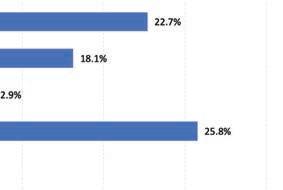
How frequently have you visited the FGCU campus over the past year?
Table 15 shows that 25.8 percent of respondents visit the campus daily or weekly, while 3.8 percent visit the campus monthly. Furthermore, 12.9 percent stated that they visit the campus six to ten times a year, 18.1 percent visit the campus three to five times per year, and 22.7 percent visit the campus one to two times per year. About 10 percent of respondents said “none of the above,” while 7.1 percent gave an answer not specified in the survey.
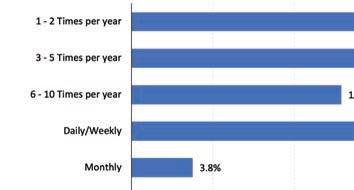
Affiliation Strongly agree Somewhat agree Neither agree nor disagree Somewhat disagree Strongly disagree N Community member 81.5% 13.4% 2.9% 0.8% 1.3% 238 Alumni 82.7% 13.4% 2.5% 0.5% 1.0% 202 Parent of a student 79.3% 10.1% 8.9% 0.6% 1.1% 179 Student 55.0% 20.2% 19.4% 3.1% 2.3% 129 Faculty member 62.3% 21.7% 11.3% 3.8% 0.9% 106 Staff member 66.3% 20.5% 10.8% 1.2% 1.2% 83 Business leader 80.5% 11.7% 5.2% 1.3% 1.3% 77 TOTAL 75.9% 14.4% 7.9% 0.9% 0.8% 872
Table 14. I am proud that FGCU is part of the Southwest Florida community.
Source: RERI analysis of data from the FGCU Strategic Roadmap Survey, conducted between November 7, 2022, and November 18, 2022
Response Count Percent 1 - 2 Times per year 199 22.7% 3 - 5 Times per year 159 18.1% 6 - 10 Times per year 113 12.9% Daily/Weekly 226 25.8% Monthly 33 3.8% None of the above 85 9.7% Other (please specify) 62 7.1% TOTAL RESPONSES 877 100.0%
Table 15. How frequently have you visited the Chart 3. How frequently have you visited the FGCU campus over the past year? FGCU campus over the past year?
FLORIDA GULF COAST UNIVERSITY STRATEGIC ROADMAP INITIATIVE - 2023 39
Source: RERI analysis of data from the FGCU Strategic Roadmap Survey
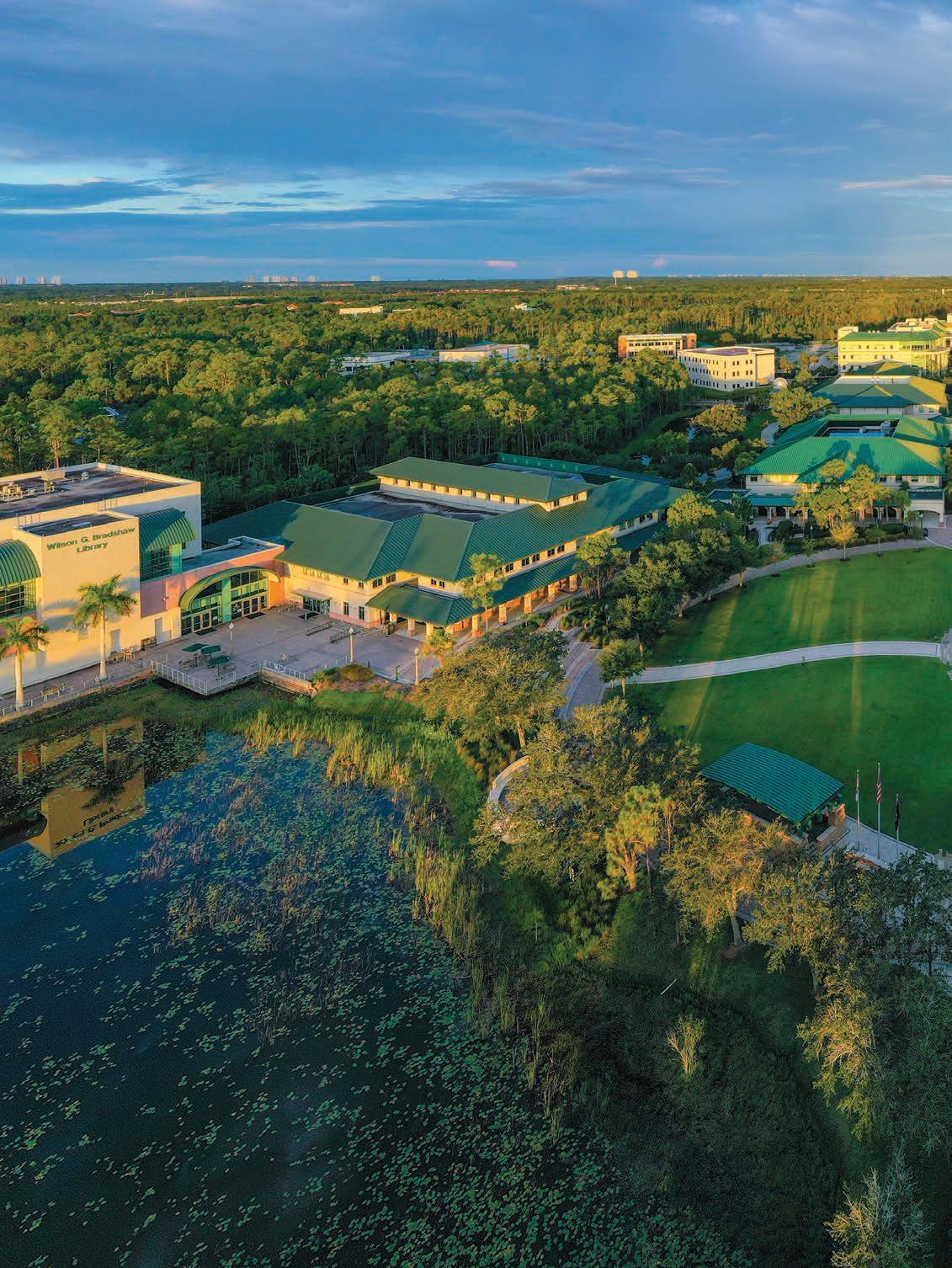
fgcu.edu









































































































































































































































































